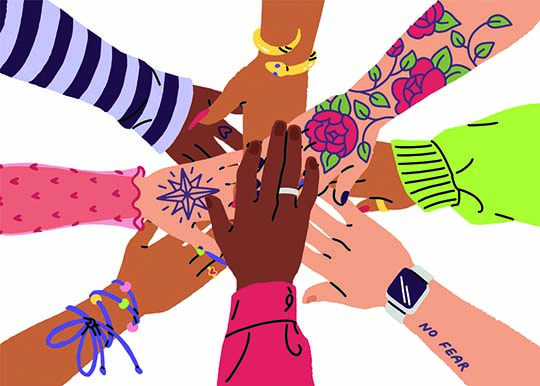In our development toward a state of emotional liberation, most of us seem to experience three stages in the way we relate to others. Stage 1:In this stage, known as...
In our development toward a state of emotional liberation, most of us seem to experience three stages in the way we relate to others.
Stage 1:
In this stage, known as emotional slavery, we believe ourselves responsible for the feelings of others. We think we must constantly strive to keep everyone happy. If they don’t appear happy, we feel responsible and compelled to do something about it. This can easily lead us to the very people who are closest to us as burdens.
Taking responsibility for the feelings of others can be detrimental in intimate relationships. I routinely hear variations on the following theme: “I’m really scared to be in a relationship. Every time I see my partner in pain or needing something, I feel overwhelmed. I feel like I’m in prison, that I’m being smothered — and I just have to get out of the relationship as fast as possible.”
This response is common among those who experience love as denial of one’s own needs in order to attend to the needs of the beloved. In the early days of a relationship, partners typically relate joyfully and compassionately to each other out of a sense of freedom. The relationship is exhilarating, spontaneous, and wonderful. Eventually, however, as the relationship becomes “serious,” partners may begin to assume responsibility for each other’s feelings.
If I were a partner who is conscious of doing this, I might acknowledge the situation by explaining, “I can’t bear it when I lose myself in relationships. When I see my partner’s pain, I lose me, and then I just have to break free.”
However, if I have not reached this level of awareness, I am likely to blame my partner for the deterioration of the relationship. I might say, “My partner is so needy and dependent it’s really stressing out our relationship.” In such a case, my partner would do well to reject the notion that there is anything wrong with his needs. It would only make a bad situation worse to accept the blame. Instead, he could offer an empathic response to address the pain of my emotional slavery: “So you find yourself in panic. It’s very hard for you to hold on to the deep caring and love we’ve had without turning it into a responsibility, duty, obligation….You sense your freedom closing down because you think you constantly have to take care of me.” If, however, instead of an empathic response, he says, “Are you feeling tense because I have been making too many demands on you?” then both of us are likely to stay enmeshed in emotional slavery, making it that much more difficult for the relationship to survive.
Stage 2:
In this stage, we become aware of the high costs of assuming responsibility for others’ feelings and trying to accommodate them at our own expense. When we notice how much of our lives we’ve missed and how little we have responded to the call of our own soul, we may get angry. I refer jokingly to this stage as the obnoxious stage because we tend toward obnoxious comments like “That’s your problem! I’m not responsible for your feelings!” when presented with another person’s pain. We are clear what we are not responsible for, but have yet to learn how to be responsible to others in a way that is not emotionally enslaving.
As we emerge from the stage of emotional enslavement, we may continue to carry remnants of fear and guilt around having our own needs. Thus it is not surprising that we end up expressing those needs in ways that sound rigid and unyielding to the ears of others.
Stage 3:
At this stage, emotional liberation, we respond to the needs of others out of compassion, never out of fear, guilt, or shame. Our actions are therefore fulfilling to us, as well as to those who receive our efforts. We accept full responsibility for our own intentions and actions, but not for the feelings of others. We are aware that we can never meet our own needs at the expense of others. Emotional liberation involves stating clearly what we are needing in a way that communicates we are equally concerned that the needs of others be fulfilled. A component of our new communication is the acknowledgement of the needs behind our feelings.
What others say and do may be the stimulus, but never the cause of our feelings. When someone communicates negatively, we have four options as to how to receive the message: (1) blame ourselves, (2) blame others, (3) sense our own feelings and needs, (4) sense the feelings and needs hidden in the other person’s negative message.
Judgments, criticisms, diagnoses, and interpretations of others are all alienated expressions of our own needs and values. When others hear criticism, they tend to invest their energy in self-defense or counterattack. The more directly we can connect our feelings to our needs, the easier it is for others to respond compassionately.
In a world where we are often harshly judged for identifying and revealing our needs, doing so can be very frightening, especially for women who are socialized to ignore their own needs while caring for others.
In the course of developing emotional responsibility, most of us experience three stages: (1) “emotional slavery” — believing ourselves responsible for the feelings of others,
(2) “the obnoxious stage” — in which we refuse to admit to caring what anyone else feels or needs, and
(3) “emotional liberation”-— in which we accept full responsibility for our own feelings but not the feelings of others, while being aware that we can never meet our own needs at the expense of others.































